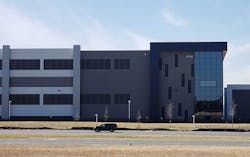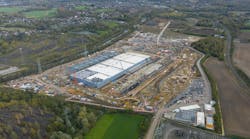Loudoun County Prepares New Rules for Where Data Centers Should Be Built
LEESBURG, Va. – The home of Data Center Alley is updating its guidelines for future data center development, and wants industry feedback prior to deciding on new rules. But first, data center companies must digest a complex proposal put forward by a Loudoun County committee on Monday night.
The regulations proposed by the Transportation and Land Use Committee (TLUC) would govern the location and appearance of future data centers, seeking to address tensions stemming from the enormous growth of the cloud cluster surrounding Ashburn, Virginia. The proposals are being sent to the full Board of Supervisors, which will consider them in late September.
Loudoun County has more data centers than anyplace on earth, with 26 million square feet of existing space, and another 8 million square feet under development. That’s because Ashburn sits atop the world’s densest intersection of fiber networks, making it an ideal location to store and distribute data for Internet companies like Amazon, Meta, Microsoft and Google.
Cloud builders’ appetite for real estate has left a limited supply of vacant land for development, driving property prices higher, and creating tensions with area residents. Local officials have responded by seeking to update county rules on where data centers should and shouldn’t be developed.
The proposed updates address two issues on future data center development in Loudoun:
- Location: The county wants to limit data center growth in some areas, including several where data center development had previously been “by-right.” The TLUC recommended that this be managed through changes to place types in the county comprehensive plan, as well as a rewrite of zoning ordinances. A major goal is to avoid data center development along Route 7, where there is limited power infrastructure to support them.
- Standards: Future data centers must meet new standards addressing high-quality building design, environmental sustainability, and their proximity to residential areas. The supervisors may also consider additional guidelines on loud noise from data center operations.
Monday’s proposal follows months of discussion by the TLUC and Loudoun County Board of Supervisors, as local officials have vigorously debated the industry’s impact on land values, residential communities, tax rates, and the county budget.
Confusion About Timelines
The data center industry had hoped to have more time to digest the proposal, and sought to have it reviewed again by TLUC in September before being sent to the Board of Supervisors.
But the TLUC opted to forward its recommendations to the supervisors for action at the board’s second meeting in September, citing a tight timeline for an overhaul of zoning ordinances, which would help implement some of the new regulations.
TLUC Chair Michael Turner apologized to the data center community for any confusion about the process.
“My intent was to try and go to a fourth meeting (in September), but the zoning ordinance rewrite is just a monumental project that we really need to move forward on,” said Turner. “We’re not trying to rush it through. The truth is this was a miscommunication, and we absolutely need to get the data center industry’s input.”
First, the industry will need to get clarity on the proposal, which left members of the TLUC confused at times. The discussions are summarized in a presentation from county staff at Monday’s meeting, which includes multiple maps. The TLUC is recommending changes to zoning ordinances as well as the comprehensive plan, which will provide more granular management of data center growth, including new design standards.
Board of Supervisors Chair Phyllis Randall said the TLUC proposal is subject to change, and emphasized the importance of feedback from the data center community in the board’s process.
Vested Rights for Existing Data Centers
The county’s zoning has defined several “place types” where data centers are a by-right development and eligible for fast-track approvals without the need for any hearings with local boards. This streamlined approach has been a key enabler of the rapid growth of the data center industry in Loudoun.
One key goal for the TLUC was to avoid data center development along Route 7, which includes numerous parcels in the Suburban Mixed-Use place type which are zoned for by-right data center development. The region does not currently have the power infrastructure to support data centers, meaning any new projects would likely require additional power lines.
With that in mind, the TLUC focused its efforts on precluding data center development in the Suburban Mixed Use place type, which includes 83 vacant parcels totaling 887 acres of land that previously supported by-right development. This is just one of multiple place types that allow by-right data center development.
The committee said existing data centers will have “vested rights” from prior legislative or administrative approvals for their properties, and in some cases, statutory protections associated with the Route 28 Tax District.
“We want to protect existing data center developments,” said Turner. “We asked the industry to come here and build. They’ve been great community partners. The goal here is to protect people with skin in the game.”
“My goal is to see data centers continue to grow and prosper here in the county,” said Supervisor Caleb Kershner. “Providing regulatory and legal certainty is important in not disrupting this industry.”
Data Center Land Banks Prompt Debate
But some data centers with vested rights could still see an impact. In areas where zoning changes preclude additional data center development, vested data centers could continue to operate but would be classified as a nonconforming use, “which would require additional approvals for expansion or improvements,” said Kate McConnell, Principal Planner for the Loudoun County Department of Planning and Zoning.
Approved data center projects, and those that have already submitted plans for approval, may move ahead. But the TLUC grappled with the proper treatment of “land banks” in the Suburban Mixed Use place type, where data center companies have bought property, but not yet entered the county approval process. That category includes 13 properties at present, according to Loudoun economic development staff.
“If they have bought land, we shouldn’t change what’s allowed on that land,” said Supervisor Tony Buffington, who noted that data center properties sell for $2 million an acre or more. “They’ve made a considerable investment in Loudoun County.”
Several other TLUC members said they were inclined to allow these projects to go forward as data centers, but preferred to make these decisions on a case-by-case basis, subject to evaluation by county staff.
‘We Are Invested in Loudoun’
The stakes are substantial for both the county and the data center sector. Data center real estate represents about 1.5% of the total land area in the county, but will contribute about 31% of all budget revenue – an estimated $575 million in fiscal year 2022.
A 2022 study from the Northern Virginia Technology Council found that data centers in Loudoun County have a 13.2 fiscal impact ratio, meaning that they pay $13.20 of local property taxes for every $1.00 of public services associated with them being in Loudoun County.
“We are invested in Loudoun, and our teams live here and work here,” said Josh Levi, President of the Data Center Coalition, in a letter to the TLUC. “We are proud of our outsized tax revenue contributions to the county to help address school funding, social services, affordable housing and many other critical county priorities.”
A key factor in that growth has been knowing what to expect, said Levi.
“Regulatory certainty and predictability are critical drivers of Loudoun’s historic success and are essential to maintaining the strength of the county’s data center sector moving forward, particularly given the size, magnitude and long-term nature of siting decisions for both existing and future investment,” wrote Levi.
Balancing Concerns of Residents, Industry
All members of the TLUC noted the importance of the data center industry. As DCF noted in February, “Loudoun County appreciates data centers. But it doesn’t want them everywhere.”
County officials are mindful of the concerns of residents, which include the exterior appearance of data centers, their proximity to residential neighborhoods, noise from equipment, and the impact of rising land values on affordable housing.
That has made for a tough balancing act for the TLUC and county planning staff, who undertook a thorough review of how the committee’s objectives could be implemented using the comprehensive plan and zoning ordinances.
“This was a very sensitive discussion,” said Turner.
Randall noted that the full Board of Supervisors will need to be brought up to speed on the proposal, as a number of supervisors are not part of the TLUC, whose sessions on future data center development spanned seven hours of discussion over three sessions.
“These three meetings were very, very involved,” said Randall. “If they’re going to be able to vote on this, I think they need to be offered a fairly detailed briefing.”
A similar challenge will face the data center industry, which must analyze the TLUC’s recommendations and develop responses that address how these changes may impact their operations in Loudoun County going forward.
“It’s not just lip service that we are asking for data center input,” said Turner. “We cannot make an informed decision at the Board of Supervisors without robust input from the data center community on these motions.”
“I hope the data center industry will have time to look at the recommendations and come back to us with a prioritized list of concerns,” said Buffington.
About the Author



